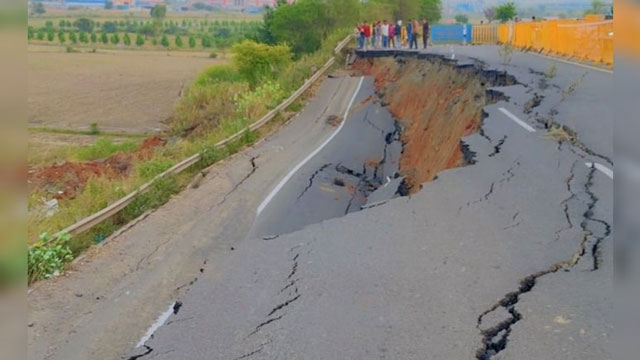Daijiworld Media Network – Bhopal
Bhopal, Oct 15: A 100-metre stretch of the Bhopal Bypass collapsed on Monday, leaving behind a 30-foot-deep crater and raising serious concerns over the quality of road construction and maintenance in Madhya Pradesh. Fortunately, no casualties were reported in the incident.
Officials said the collapse occurred suddenly, and there were no vehicles on the affected stretch at the time. The Madhya Pradesh Road Development Corporation immediately barricaded the site and diverted traffic to an adjoining lane to ensure smooth movement.

Preliminary findings revealed that the reinforced earth wall was not built according to approved standards. The soil used was substandard, and stone pitching work meant to prevent erosion and water seepage was not done. Waterlogging caused by farmers digging soil near the retaining wall further weakened the embankment, eventually leading to the collapse during the monsoon.
Taking serious note of the incident, MPRDC Managing Director BS Meena formed a three-member committee comprising Chief Engineer BS Meena, General Manager Manoj Gupta, and General Manager RS Chandel to investigate the matter and submit a report within seven days.
MPRDC Divisional Manager Sonal Sinha said about 100 metres of the road caved in, forming a deep crater. He added that the preliminary investigation points to a retaining wall failure, though the exact cause will be known after the final report.
The Bhopal Eastern Bypass connects major routes to Indore, Hoshangabad, Jabalpur, Jaipur, Mandla and Sagar. It was built by M/s Transtroy Private Limited, Hyderabad, under the Build-Operate-Transfer model and completed in 2012–13. The company’s contract was terminated in 2020 for non-compliance, and it was blacklisted for three years. Since then, MPRDC has managed the bypass directly.
Repair work on the damaged stretch has already begun, and officials have set a ten-day deadline for restoration. Soil samples from the site have been sent to the Public Works Department’s Central Laboratory for testing.
The incident has once again highlighted the poor quality of road construction in the state, where engineers have repeatedly warned that weak soil compaction, poor drainage, and neglected maintenance can lead to such structural failures.